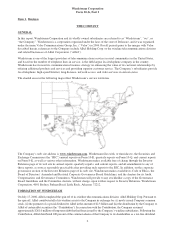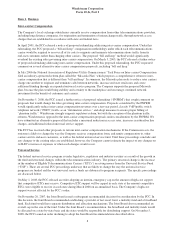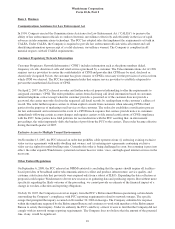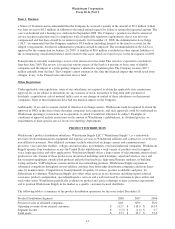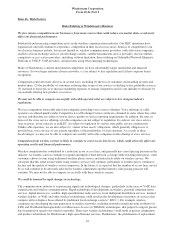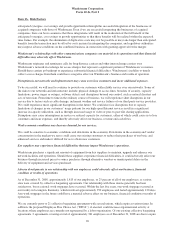Windstream 2008 Annual Report Download - page 60
Download and view the complete annual report
Please find page 60 of the 2008 Windstream annual report below. You can navigate through the pages in the report by either clicking on the pages listed below, or by using the keyword search tool below to find specific information within the annual report.
Windstream Corporation
Form 10-K, Part I
Item 1. Business
• Our regulated Missouri wireline subsidiary is subject to an alternative regulation election established by statute.
Under Missouri’s alternative regulation as well as legislation enacted in 2008, basic local service and intrastate
network access rates may be adjusted annually based on changes to the urban consumers component of the
Consumer Price Index. There is total pricing flexibility for non-basic services, and revenue neutral rate
re-balancing is permitted on an annual basis.
• Our regulated Nebraska operations are subject to alternative regulation established by Nebraska statute. In
exchanges where local competition exists, companies can change rates upon ten days notice to the PSC. In
exchanges where the PSC determines that local competition does not exist, companies can change rates for all
services except basic local service with ten days notice to the PSC. In these exchanges, basic local rates may be
increased upon ninety days notice to affected subscribers. Basic local rate increases are reviewed by the PSC only
if rates are increased more than 10 percent in twelve consecutive months or in response to a formal complaint
signed by at least 3 percent of affected subscribers.
• On April 1, 2006, the New Mexico PSC began regulating Windstream pursuant to rules that govern retail prices
and service quality. These rules, adopted in January 2006, allow Windstream pricing flexibility on retail services.
The rules also streamline the introduction and withdrawal of tariffs and the packaging and bundling of services.
The PSC also adopted rules in late 2005 pertaining to intrastate network access rate reform. The rules generally
required: 1) the reduction of intrastate access rates to interstate levels according to prescribed criteria; 2) the
establishment of the initial benchmark rates to be used to determine support from the state USF; and 3) the
creation of a state USF to ensure revenue neutrality in connection with (1). On April 1, 2006, these rules were
implemented and all ILECs, including Windstream, reduced their intrastate network access rates to interstate
levels and began receiving support from the newly created state USF. Windstream expects to receive
approximately $8.4 million annually from the New Mexico state USF.
• We have two regulated operating subsidiaries in North Carolina. The subsidiaries separately implemented PSC
approved alternative regulation plans in 1997 and 1998, respectively. Local rates are adjusted annually by the
annual change in GDP-PI. Rate changes are effective upon 14 days notice. In September 2005 and March 2006,
the Commission approved requested changes to the price regulation plans.
• Our regulated Ohio wireline subsidiaries began in 2004 to operate under an alternative regulation plan established
by the Public Utilities Commission (“PUC”). Under this plan, basic service rates have been capped. Non-basic
service rates are subject to limited pricing flexibility. As of August 2006, new rules for alternative regulatory
treatment of basic service have been adopted. Windstream is evaluating the residential basic local exchange rate
flexibility rules at an exchange level.
• We have three operating subsidiaries in Oklahoma, each of which operate under an alternative regulation plan
established by Oklahoma statute. Under this plan, basic service rates can be increased annually as long as the
increase does not exceed $2.00. Legislation was enacted in May 2004 that regulates Windstream Communications
Southwest (approximately 72 percent of access lines in Oklahoma) as a rural telephone company, thereby
allowing this property significant pricing freedom for its basic services and reducing its costs of regulation.
• In July 2005, our regulated Pennsylvania subsidiary began operating under an alternative regulation plan passed
by the Pennsylvania General Assembly in 2004. Under this plan, we are required to make high-speed Internet
access available for purchase to 100 percent of our customer base by 2013. The plan also limits rate increases to
the GDP-PI less 2 percent, annually. Rates for services the PSC has deemed to be competitive based on
demonstrated availability of like or substitute services offered by alternative service providers are not regulated,
but the public utility commission retains authority over the quality of these services. Revenue neutral rate
rebalancing is also permitted for services not deemed competitive by the PSC.
• Our regulated South Carolina operations are subject to alternative regulation established by South Carolina statute.
Local rates can be adjusted pursuant to an inflation-based index. All other service rates may be increased subject
to a complaint process for abuse of market position. The PSC has determined that any allegations of abuse of
market position will be investigated on a case-by-case basis. Rate increases become effective 14 days after filing.
12


